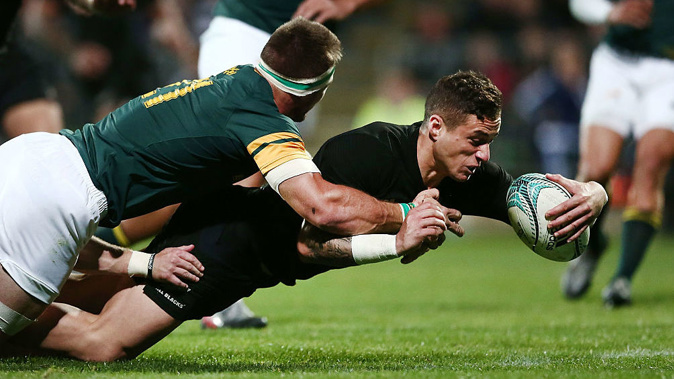For the fourth game in a row there was daylight between them and their opponent. The scoreline only partly tells the story - it doesn't quite detail just how much and where there was daylight between the two teams.
South Africa could tick all the obvious and expected boxes such as set-piece solidity - although their scrum was creaking badly - and defensive linespeed and accuracy. But they brought so little else and the days of being able to win a test on muscularity alone are long gone.
That sort of approach was able to keep them just about in touch for 55 minutes or so before they capitulated.
And these days of limited game plans are gone because the All Blacks can tick all the foundation boxes and so many more. Their ability to use the ball is reaching new and unprecedented heights.
How were the Boks ever going to compete against a team with a player like Dane Coles? The All Blacks hooker set up two tries in the first half with beautifully-timed passes and then a third in the second when he threw a huge, perfect pass to Sam Whitelock on the wing.
A hooker firing a perfect long pass to a lock out in the open ... it's just standard fare for the All Blacks but light years ahead of what the South Africans were capable of.
Then there is the speed of their movement and decision making. They assess where the space is so quickly and effortlessly and flood the holes with runners. The Boks could only stick a finger in the dam as it were: make so many tackles before they could no longer halt the black tide.
As per the custom, resistance began to wane as the final quarter arrived. It was then, as they nearly always do, that the All Blacks shifted a gear.
They upped the tempo, found the width and continuity and three quick tries to kill off the contest. The final 10 minutes were all about how much pride the Boks had and how disciplined the All Blacks could be in not trying to over-complicate things and get greedy.
Simple rugby had broken the Boks and simple rugby would be the way to add to their pain. Pass and catch and use the space - its simplicity was audacious but effectiveness breathtaking.
How many tests away the Boks are from being able to remotely emulate this type of rugby is hard to tell. Their problems are extensive and some were self-inflicted.
They talked about soft moments having cost them in the recent past and vowed to cut them out. To beat the All Blacks, it had to be a 10-out-of-10 performance.
They couldn't manage it, though. After they constructed their impressive opening try when they found holes in the All Blacks' defence up the middle and then stretched them wide, Elton Jantjies fumbled the kickoff 5m from his own line.
That sort of stuff is a killer, especially when the All Blacks put down a rock-solid scrum and scored two phases later when Israel Dagg was played in by Coles. It was the old classic of being vulnerable straight after a score. When teams play against the All Blacks, they can't afford to make things any easier than they need to be.
Every half-chance has to be converted, every tackle made and a bit of luck is probably a necessary these days, too.
They played a little too deep and laterally and were just a touch hesitant. They also passed and ran from deep inside their own territory more than Springboks teams in the past would have dared. It didn't really do them any good and this is where they have to tidy their thinking. How can they best mix their traditional strengths with their emerging hoard of adventurers?
Booting the ball down the other end always used to work for them and probably would again - except now they could be a little more expansive and creative with what they do without once they are down there.
New Zealand 41 (I. Dagg, J. Savea, B. Smith, A. Savea, S. Whitelock, TJ Perenara tries; B. Barrett 4 cons, pen)
South Africa 13 (B. Habana try; E. Jantjies con, 2 pens).
Halftime: 15-10.










